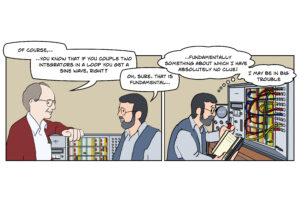
In 1978, Rich Jagacinski hired me as a graduate research assistant to help with a project to compare peoples' ability to track a target based on kinesthetic feedback with the ability to track the same target based on visual feedback (1). I was totally unprepared at the time, and even after 6 years of graduate school, I was only beginning to understand the technical aspects of 'control theory.' However, eventually, I was able to co-author a text with Rich to help introduce the technical aspects of control theory to other social scientists (2). But this was only the beginning of a long journey to explore the dynamics of complex couplings of humans, technologies, and ecologies.
Eventually, I have come to the conclusion that control theory has absolutely nothing to do with 'control.' Further, the metaphor of the 'steersman' associated with cybernetics is completely misleading as a framework for understanding human performance. This metaphor suggests that humans determine the behavior of an organization, when in fact, many other factors contribute to shaping the ultimate performance of any organization. The myth that humans are 'in control' leads to humans getting too much credit when things work well (the mythical hero leader) and too much blame when things don't work well (the myth that human error is the 'cause' of most accidents).
On the other hand, behaviorism is the myth that human behavior is 'controlled' by the situations (i.e., the stimulus). Despite the fact that even the transfer function for the human tracker must change as a function of the dynamics of the plant being controlled (as reflected in McRuer's Crossover Model); and despite the fact that 'context matters,' it is erroneous to think that the stimulus or the context determines or controls behavior.
So if nothing is 'in control,' how can we possibly understand or explain the performance of even simple organizations. If nothing is in control, does anything 'determine' performance? What matters? (3) The answer lies in the dynamics of coupling or of networks. Ultimately, performance reflects the demands of stability. The behaviors that persist are the behaviors that lead to network stability. Ultimately, control theory and dynamical systems theory are NOT about 'control,' but about 'stability.' Further, stability is an emergent or relational property of a network. It cannot be localized in any of the elements of the network. This is why any theory that tries to attribute 'control' or 'cause' to any component will simply be wrong!
A better metaphor for understanding the coupling within a closed loop is the prey-predator relation. Who determines the population in an ecology, the predator or the prey? This is obviously a silly question. The population depends on a delicate balance between predators and prey. If this relation is out of balance the ecology will eventually collapse.
A necessary step toward understanding performance is to abandon the illusion of 'control' (or causality) and to begin framing questions to explore the properties that contribute to the emergence of stability. It is important to shift our focus from the elements in an organism or organization to include the relations across the elements that lead to a healthy balance.
(1). Jagacinski, R.J., Flach, J.M., & Gilson, R.D. (1983). A comparison of visual and kinesthetic tactual displays for compensatory tracking. IEEE Transactions on Systems, Man, and Cybernetics, 13(6), 1103-1112.
(2) Jagacinski, R.J. & Flach, J.M. (2003). Control Theory for Humans: Quantitative approaches to modeling performance. Mahwah, NJ: Erlbaum. ISBN-13: 978-0805822939
(3). Flach, J.M. & Voorhorst, F.A. (2020). A Meaning Processing Approach to Cognition: What Matters? New York: Routledge.
